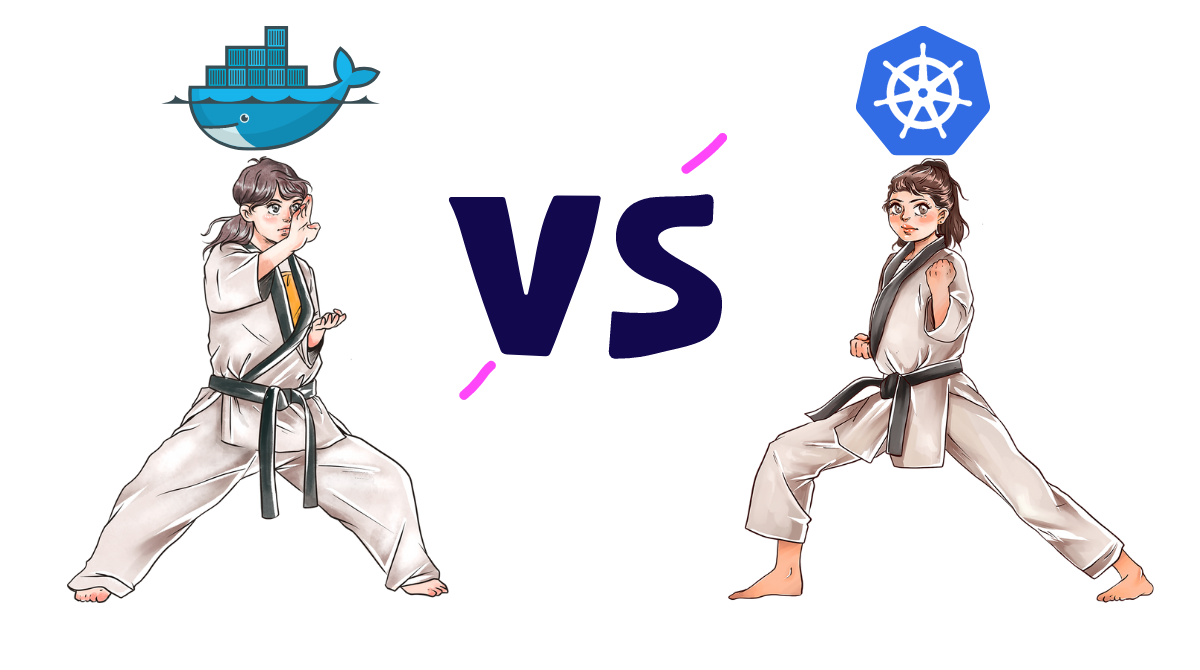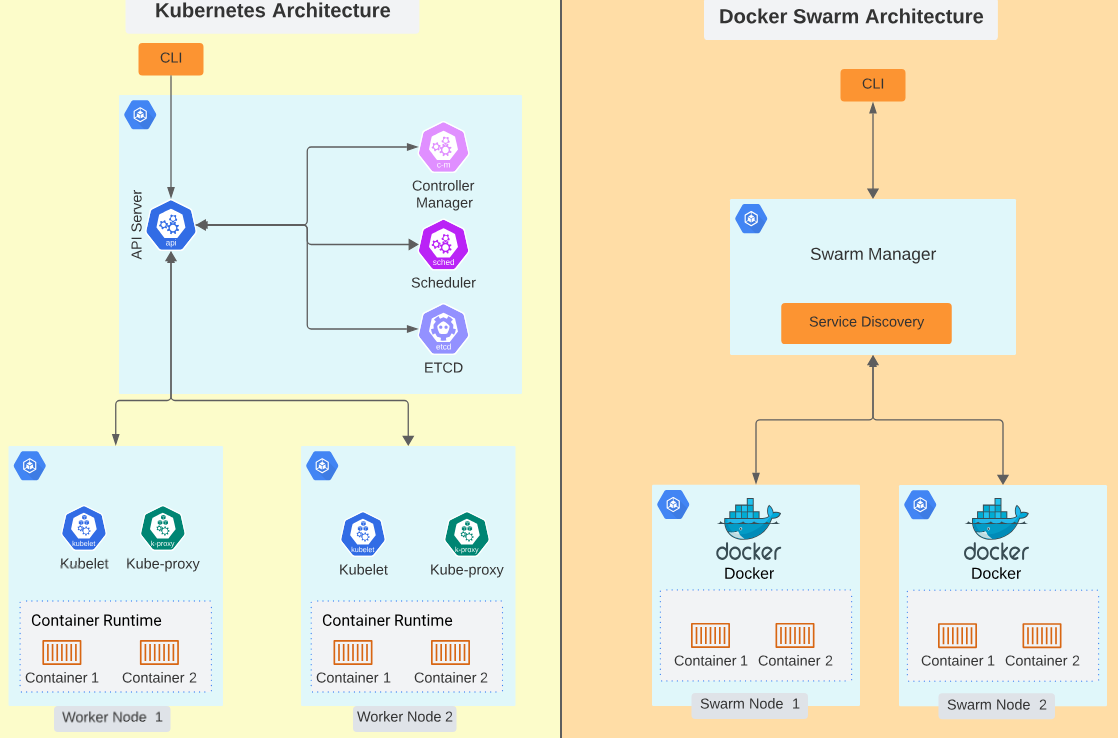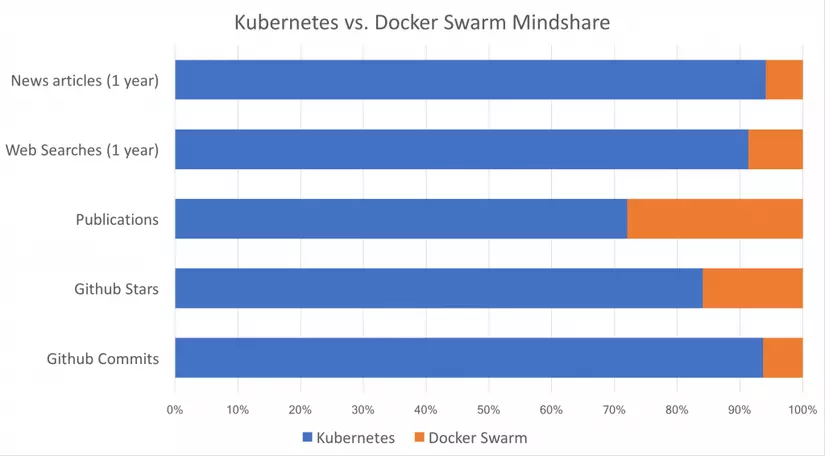Kubernetes vs Docker Swarm

Now that we have covered the advantages and challenges of Kubernetes and Docker Swarm, let’s see how they differ from one another.
The major difference between the platforms is based on complexity. Kubernetes is well suited for complex applications. On the other hand, Docker Swarm is designed for ease of use, making it a preferable choice for simple applications.
Here are some detailed differences between Docker Swarm and Kubernetes:
Architecture Comparison
Below is the simplified architecture of two tools:

From the diagram above, you can see that Kubernetes has more components. On the other hand, you can see the simplicity of Docker Swarm.
Difference between Kubernetes and Docker.
This comparison is synonymous with the Kubernetes vs. Docker Swarm - Docker's own container orchestration technology. The basic difference is that Docker only manages a single node (many containers in 1 node) while Kubernetes manages a cluster of nodes. => Kubernetes has the ability to deploy more widely, serving real-world products more effectively. It has been shown that Kubernetes leads every metric when compared to Docker Swarm:

The another difference is that Kubernetes is a container orchestration system that manages multiple containers. Docker Swarm does not manage any containers but instead is a cluster manager for Docker containers. Kubernetes also has built-in support for stateful applications, whereas Docker Swarm does not.
Kubernetes is designed to work with any programming language and framework, while Docker Swarm only works with the Docker Engine API.
Kubernetes runs on top of Linux Containers while Swarm runs inside Docker Containers.
Kubernetes uses a master-slave architecture where one master instance controls multiple worker instances; Kubernetes uses an active/passive model where each worker instance is controlled by its own master instance.
Point of comparison
Kubernetes
Docker Swarm
Installation
Complex
Comparatively simple
Learning curve
Heavy
Lightweight
GUI
Detailed view
No GUI, needs third party
Cluster setup
Easy
Easy
Availability features
multiple
minimal
Scalability
All-in-one scaling based on traffic
Values scaling quickly (approx. 5x faster than K8s) over scaling automatically
Horizontal auto-scaling
Yes
No
Monitoring capabilities
Yes, built-in
No, needs third party
Load balancing
No built-in internal auto load balancing
Internal load balancing
Security features
Supports multiple security features
Supports multiple security features
CLI
Needs a separate CLI
CLI is out of the box
Community
Active
Active
Installation and setup
Kubernetes is very customizable but complex to set up. Docker Swarm is easier to install and configure.
Kubernetes: Depending on the operating system, manual installation can differ for each OS. If you are using services from a cloud provider, installation is not required.
Docker Swarm: Docker instances are typically consistent across operating systems and thus fairly simple to set up.
Load balancing
Docker Swarm offers automatic load balancing, while Kubernetes does not. However, it is easy to integrate load balancing through third-party tools in Kubernetes.
Kubernetes: Services are made discoverable through a single DNS name. Kubernetes accesses container applications through an IP address or HTTP route.
Swarm: Comes with internal load balancers.
Monitoring
Kubernetes: Kubernetes has built-in monitoring along with third-party monitoring tools integration support.
Docker Swarm: In contrast, there are no in-built monitoring mechanisms in Docker Swarm. However, Docker Swarm supports monitoring through third-party applications.
Scalability
Kubernetes: Provides scaling based on traffic. Horizontal autoscaling is built in. Scaling in Kubernetes involves creating new pods and scheduling them to nodes with available resources.
Docker Swarm: Offers autoscaling of instances quickly and on-demand. As Docker Swarm deploys containers quicker, it gives the orchestration tool faster reaction times that enable on-demand scaling.
Which platform should you use?
Both Kubernetes and Docker Swarm serve their particular use cases. Which one is best for you depends on your or your organization's current needs.
When starting, Docker Swarm is an easy-to-use solution to manage your containers at scale. If you or your company does not need to manage complex workloads, then Docker Swarm is the right choice.
If your applications are critical and you are looking to include monitoring, security features, high availability, and flexibility, then Kubernetes is the right choice.
Last updated